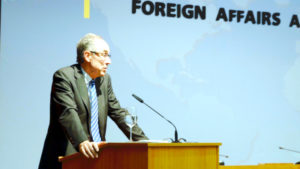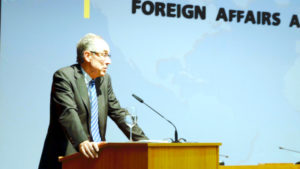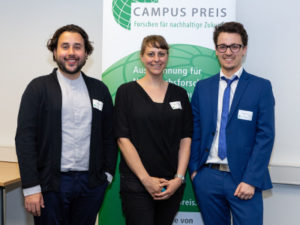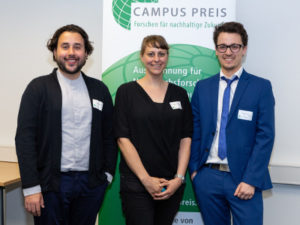
SDSN Germany organised in cooperation with adelphi and the German Federal Foreign Office, a launch event on the new essay series of adelphi “Driving Transformative Change: Foreign Affairs and the 2030 Agenda” in Berlin on 30 April. The implementation of the 2030 Agenda for Sustainable Development can prevent conflict and safeguard global stability – and, as the new adelphi study shows, foreign policy plays a decisive role here. During the panel discussion, Susanne Baumann (German Foreign Office), Oli Brown (Chatham House), Fatima Denton (UNU), Adolf Kloke-Lesch (SDSN Germany), David Steven (New York University) and Verónica Tomei (German Council for Sustainable Development) debated these issues with experts in foreign and development policy, civil society and academia.
On 21 May, Engagement Global, Germanwatch, adelphi and SDSN Germany organised an expert workshop on “Populism and Sustainability” in Berlin. After representatives of the network had given their short inputs, experts from academia, including Bernd Sommer (Flensburg University), Christine Hackenesch (DIE), Dennis Eversberg (Jena University) and Beate Küpper (University of Applied Science Niederrhein), gave scientific presentations. The participants discussed the topic in an interdisciplinary setting and identified potential fields of activity and research gaps.
The “Beirätedialog 2019: Will it be more difficult to advise about the future?” was hosted by the Berlin-Brandenburg Academy of Sciences on 23 May. It discussed the German Sustainability Strategy and Agenda 2030 as a frame of reference for further cooperation. Representatives of the scientific advisory councils (Beiräte) of the federal government and various federal ministries discussed the challenges for policy-making. Participants identified innovations and impulses for science-based, future-oriented policy-advice under changed conditions. Innovation and impulses were identified from various stakeholder perspectives. Subsequently, various stakeholders examined the transformative power of the German Sustainability Strategy from their respective perspectives and identified concrete pathways to strengthen it. SDSN Germany is co-chair of the German Science Platform on the 2030 Agenda, which facilitates the meeting of the scientific advisory committees. The secretariat of SDSN Germany is hosted by the DIE.




